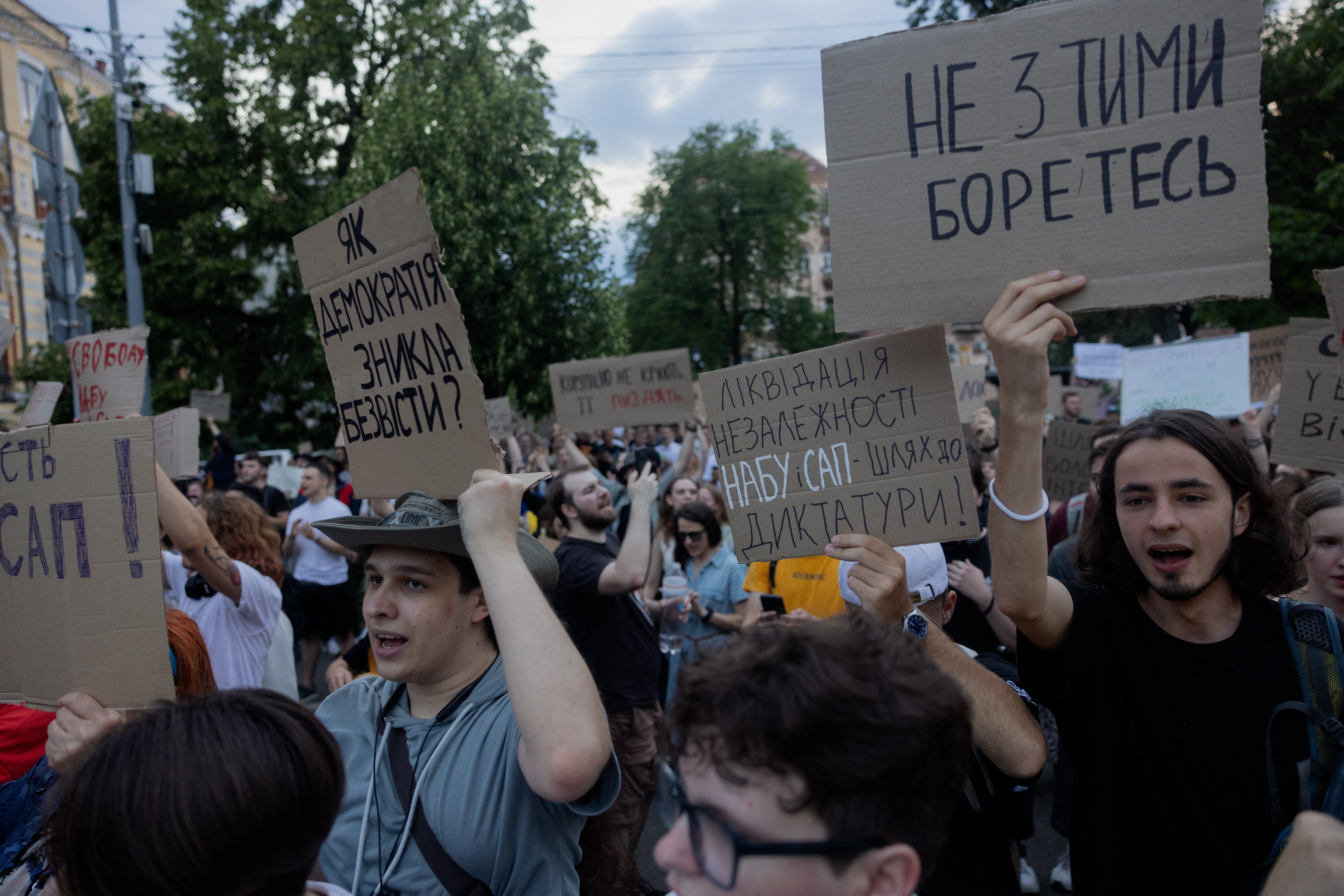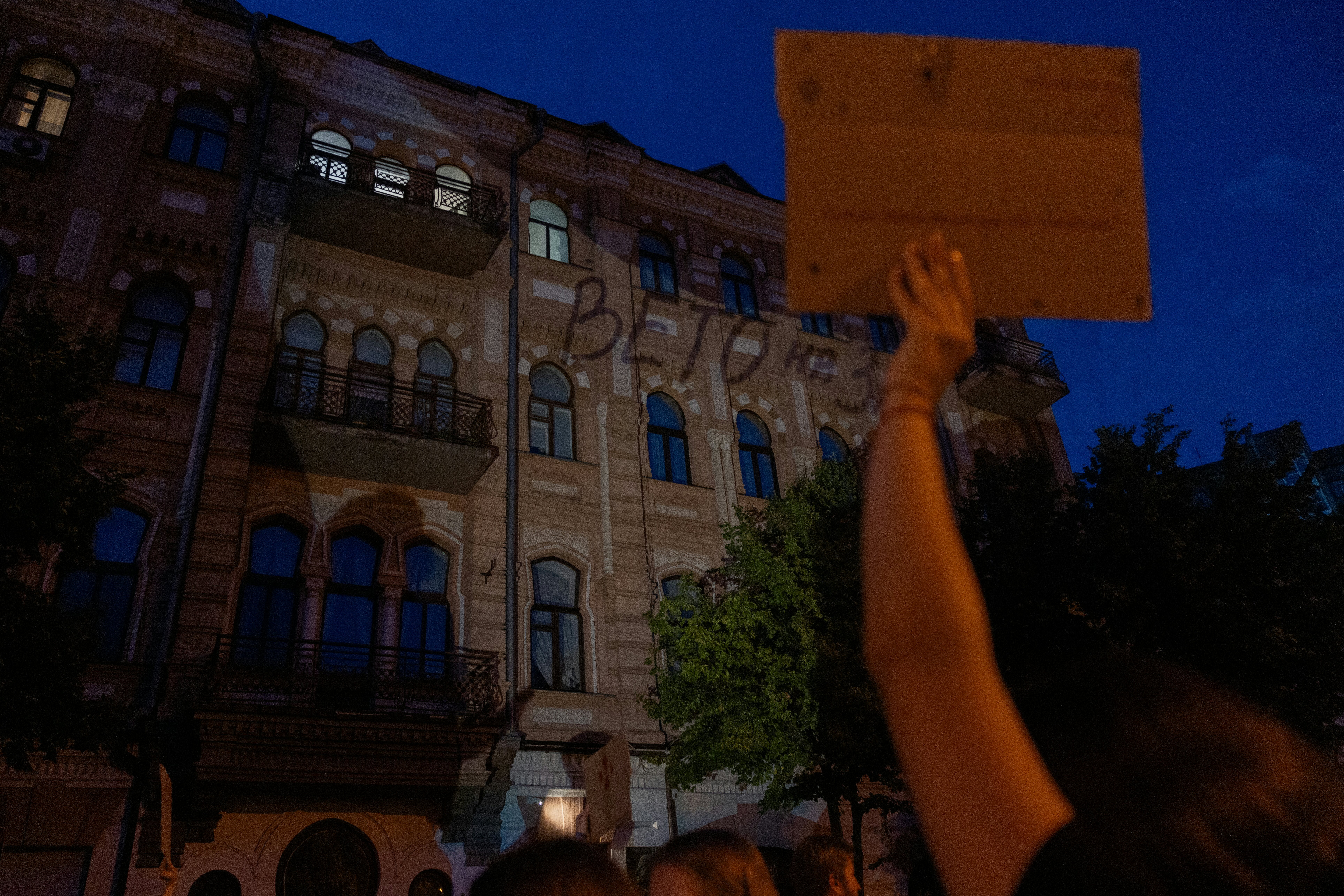Hundreds of people gathered in Ukraine’s capital Kyiv to lodge their protest with the Volodymyr Zelensky’s administration for passing a controversial bill tightening restrictions on its anti-corruption agencies, presenting the war-hit nation with its biggest domestic turmoil since the Russian invasion in February 2022.
Ukraine’s parliament on Tuesday passed amendments to allow the country’s general prosecutor, appointed by the president, strict control over two anti-corruption bodies – the National Anti-Corruption Bureau of Ukraine (Nabu) and the Specialised Anti-Corruption Prosecutor’s Office (Sapo).
President Zelensky, whose party holds a majority in parliament, approved the amendments late on Tuesday. The changes would allow the general prosecutor to transfer cases from the agencies and reassign prosecutors.
In his nightly televised address, Zelensky said the corruption fighting agencies would continue to function "but without any Russian influence".
"It all must be cleansed," he said.
In the morning, he met officials including the heads of Nabu and Sapo and said he would unveil a new plan to fight corruption within two weeks.
"We hear society," he wrote on Telegram. "We all have a common enemy, the Russian occupiers, and the protection of the Ukrainian state requires sufficient strength of the law enforcement and anti-corruption systems, and therefore a real sense of justice."
The move has alarmed the country as this could result in granting more power to Ukraine's chief prosecutor Ruslan Kravchenko, also seen as a Zelensky loyalist, to reassign corruption probes to investigators of their preference.
Shortly after the bill was cleared in parliament, hundreds of people gathered in Kyiv carried placards to protest. Protests also broke out in other cities like Dnipro, Lviv and Odesa.
“We chose Europe, not autocracy,” read one placard by a demonstrator. Another read: “My father did not die for this.”

The vote was denounced on social media as a betrayal of Ukraine’s decade-long geopolitical ambition. The protests echoed the long-standing sentiment of fighting corruption in Ukraine as critical to erasing a legacy of Russian rule.
Large protest in Kyiv tonight, the first signs of public dissent against Zelenskyy’s government since the full scale invasion, as demonstrators rally against the passing of a bill stripping anti-corruption bodies of their powers pic.twitter.com/xcMiXLAhRc
— Oz Katerji (@OzKaterji) July 22, 2025
Vladyslava Kirstyuk, 18, said memories of her childhood in occupied eastern Ukraine, after Russia's covert invasion in 2014, left a strong impression.
"I know what it means for one person to have all the power, when nothing is transparent and everything is working against you," she said. "I don't want it to be the same for us here."

Mr Zelensky also said he had spoken to Nabu chief Semen Kryvonos and other top prosecutors.
Mr Kryvonos had urged the Ukrainian president to not sign the fast-tracked bill, which he called an attempt to "destroy" Ukraine's anti-corruption infrastructure.
The two agencies – Nabu and Sapo were set up in the country after the 2014 Maidan revolution toppled a pro-Russian president and set Kyiv on a Western course. They are credited for their work to tackle corruption and graft in Ukraine during the war, levelling charges against lawmakers, ministers and a former deputy head of Zelensky's administration.
Happening now: The largest protest of wartime Ukraine is underway in central Kyiv over President Zelensky’s push to dismantle the country’s independent anticorruption agencies. Thousands of protesters and more pouring in. Chants of “Shame!” among others. They demand Zelensky veto… pic.twitter.com/ojEiEuLPNv
— Christopher Miller (@ChristopherJM) July 22, 2025
“Last week, we ran an editorial warning of an anti-democratic backslide in Ukraine. Today, it’s happening in plain sight. This isn’t what our people have been fighting and dying for, and it’s devastatingly unfair to them,” said Olga Rudenko, the chief editor of Ukrainian publication The Kyiv Independent.
Ukraine is also facing backlash from anti-graft campaigners who have been alarmed since the government charged a top anti-corruption activist this month with fraud and evading military service. The move has been dubbed as political retribution by authorities for exposing corrupt officials.
Rooting out endemic corruption and graft is critical for Ukraine to join the European Union and also a key condition to receive western aid at a time the country is battered by war.
The European Union enlargement commissioner Marta Kos said she was "seriously concerned" by Tuesday's vote.
"The dismantling of key safeguards protecting NABU's independence is a serious step back," she said, adding that rule of law was at "the very centre" of EU accession talks.
The issue risks antagonising Kyiv's most loyal allies at a particularly risky time, when it is trying to smooth over the relationship with Washington, where President Donald Trump has frequently criticised Zelensky.
"Ukraine’s anti-corruption institutions are vital to its reform path. Restricting them would be a significant setback," Dutch foreign minister Caspar Veldkamp said in a post on X.
Benjamin Haddad, France's European Affairs minister, said it was not too late to reverse the decision.
Yaroslav Zheleznyak, from Ukraine's opposition Holos party, said that he and several other lawmakers would propose a bill "to overturn this big shame that was adopted and signed", and also challenge the law in the Constitutional Court.
Ukraine-Russia war latest: Kyiv and Moscow resume drone attacks after peace talks end
Ukraine protests: Why are Ukrainians protesting against President Volodymyr Zelensky?
Europe's central bank to hold off on another rate cut until it knows how bad the tariff blow will be
Turkey wildfires leave 10 dead and 14 in hospital
Shark bites surfer’s leg in bloody attack off Canary Island’s coast
French skiing federation suspends Olympic medalist Joël Chenal amid sexual harassment allegations







